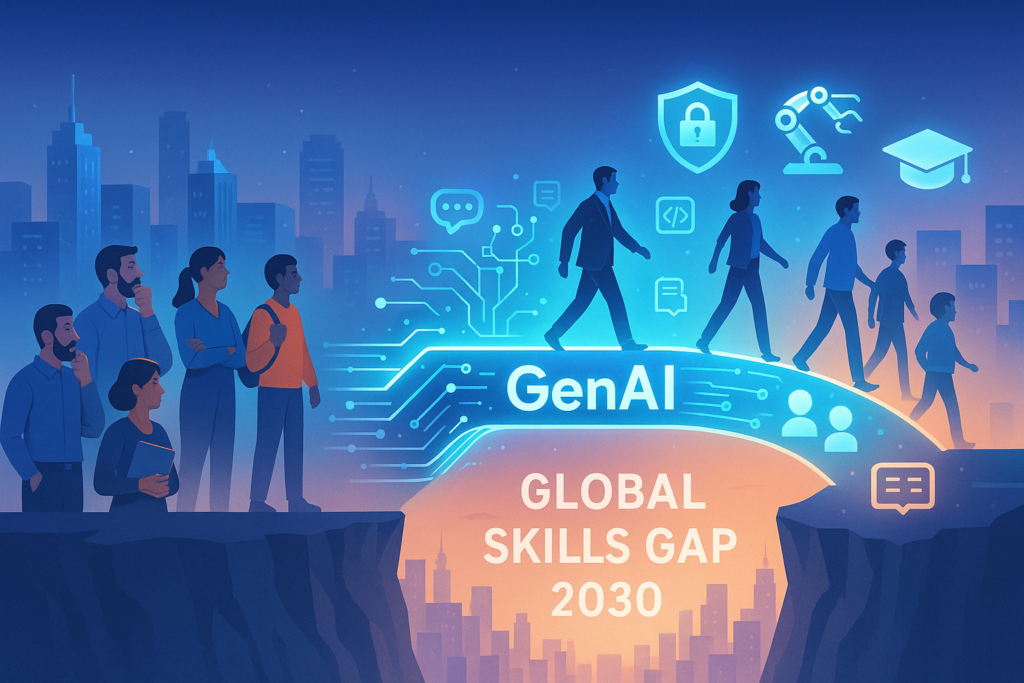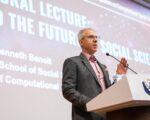
The World Economic Forum’s “The Future of Jobs Report 2025” forecasts that by 2030, AI and big data skillsets will be indispensable across industries. Employers expect technological skills to outpace all other types of skills over the next five years.
Topping this list are AI and big data, followed by networks and cybersecurity, and technological literacy. In contrast, traditional skills like reading, writing, and mathematics, along with manual dexterity, endurance, and precision, have seen the sharpest decline in projected future demand.
AI and big data are set to expand significantly in nearly every sector, with over 90 per cent of respondents in the top 10 industries anticipating an increase in these skills’ use.

The state of GenAI: Individual vs. corporate adoption
A global study titled “AI and the Future of the Global Chartered Accountancy Profession”, conducted by Chartered Accountants Worldwide (CAW) and Ipsos UK in April 2025, echoes these findings. ISCA, co-chair of the CAW Technology Taskforce, provided insights into the profession’s future.
The survey indicates that AI will enhance rather than replace chartered accountants’ roles. However, opinions diverge on preparedness for AI’s impact, which may relate to how often individuals use AI in their daily tasks. Often, AI adoption among chartered accountants starts at a grassroots level, driven by personal initiative rather than organisational directives. Those frequently using AI tend to do so for personal efficiency, learning on their own time.
Notably, 52 per cent of surveyed Chartered Accountant members cited insufficient skills and training as the biggest barriers to AI adoption, particularly in senior roles.
Accountancy professionals in Singapore indicated a higher level of preparedness for AI’s impact on their roles compared to the global average. Nonetheless, they also expressed slightly increased concern about the potential for accountants to be replaced by automation.

Addressing skills gaps with GenAI and non-accountants
Relatedly, a 2024 BDO study reveals that leaders facing accounting talent shortages are employing various strategies to fill critical gaps. Talent scarcity hinders technology implementation and strong data governance, both vital for audit quality. While 68 per cent of respondents plan to recruit experienced accountants, 61 per cent turn to AI for efficiency gains, and another 61 per cent focus on upskilling and reskilling.
Emerging strategies also include hiring non-accountants, like data scientists, to support finance functions. As reliance on advanced technology grows, a well-educated and adaptable workforce is crucial for effective tool deployment and managing modern audits’ complexities.
Investing in training: A path to closing the gap
According to the World Economic Forum, recent initiatives in reskilling, upskilling and redeployment show positive impacts on the global workforce, reducing the rate of skills obsolescence. Despite this, training remains inconsistent across economies and professions. The CAW report highlights a gap between employees receiving AI training and those willing to participate in future programmes, underscoring the need for enhanced training offerings.
A robust global partnership involving governments, employers and trade unions is essential for distributing training support evenly through funding, policy and collaborative efforts. This approach can cultivate a more resilient workforce over the next five years.
Says ISCA CEO, Fann Kor: “[Our] study found that…while they are engaging with AI, about half lack confidence in applying it to more complex tasks. To help the [Chartered Accountants in Singapore] harness AI’s full potential, ISCA has set aside S$2 million to champion AI initiatives, working with educators to produce AI-ready accountants, influencing policies to facilitate AI adoption, building case studies to create greater awareness and enhancing AI education as part of continuous learning.”
Investing in comprehensive and inclusive training programmes is the clear path forward to bridging the global skills gap and ensuring a future-ready workforce. Are you ready?








